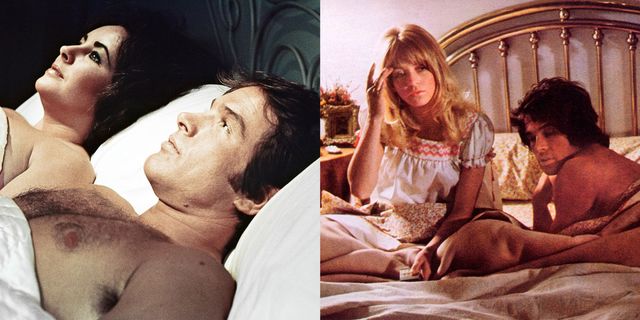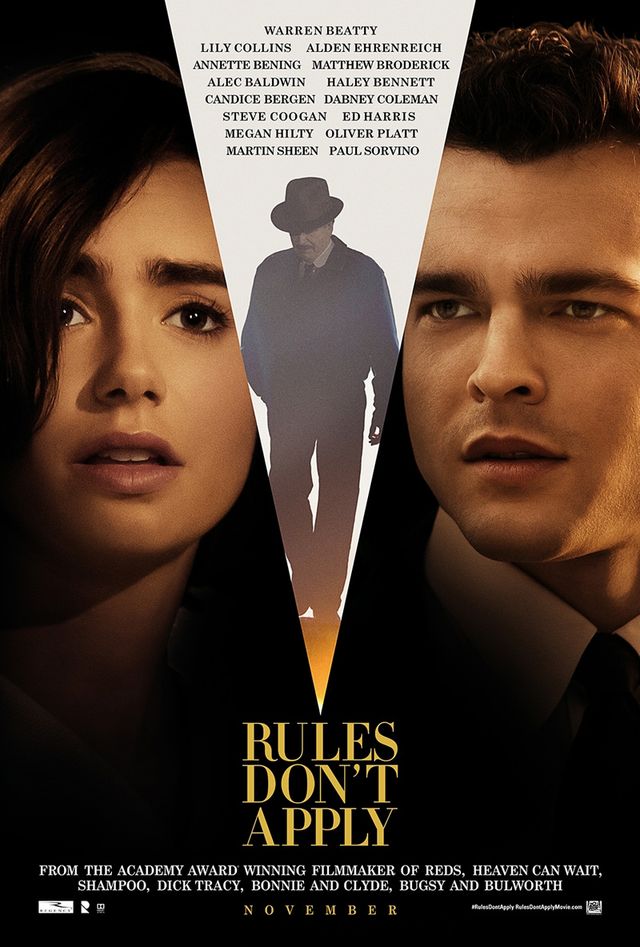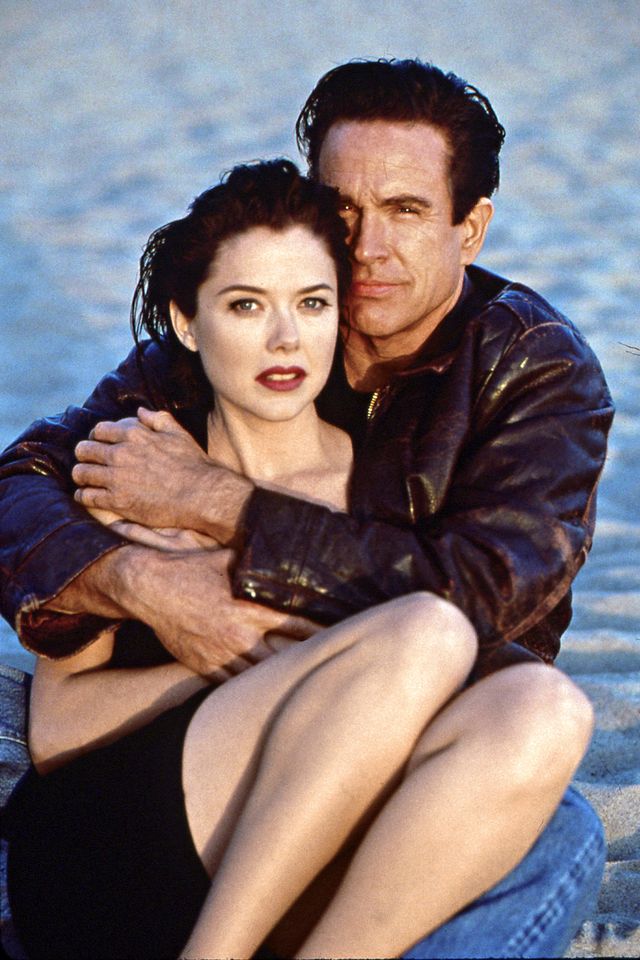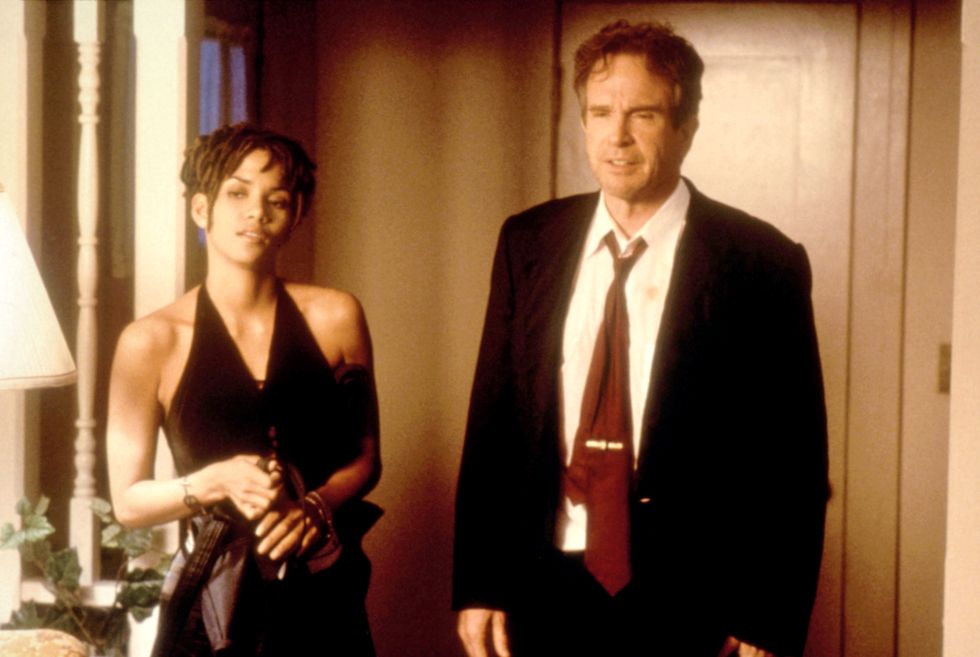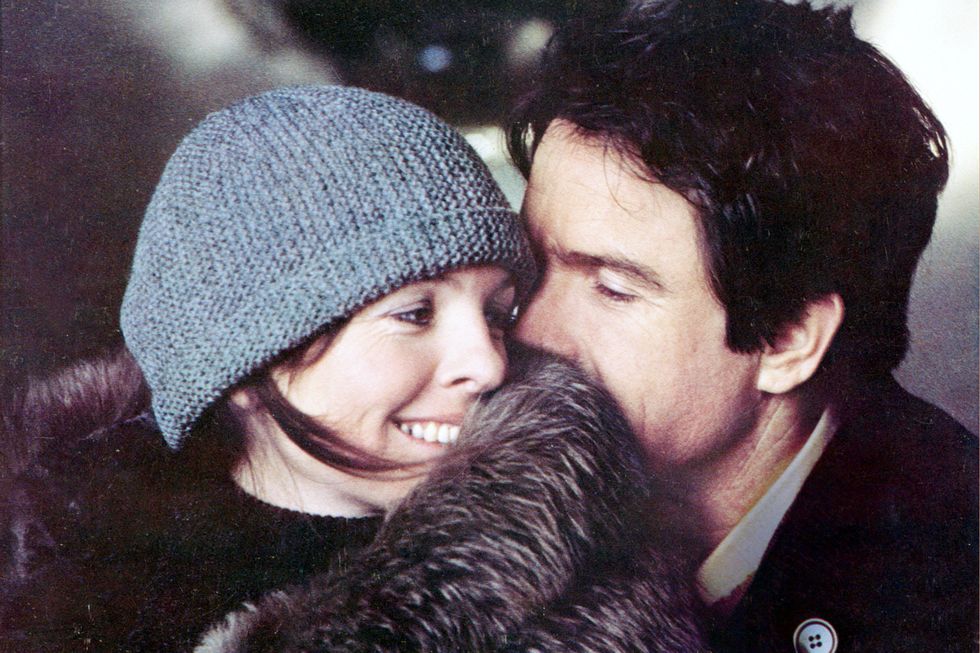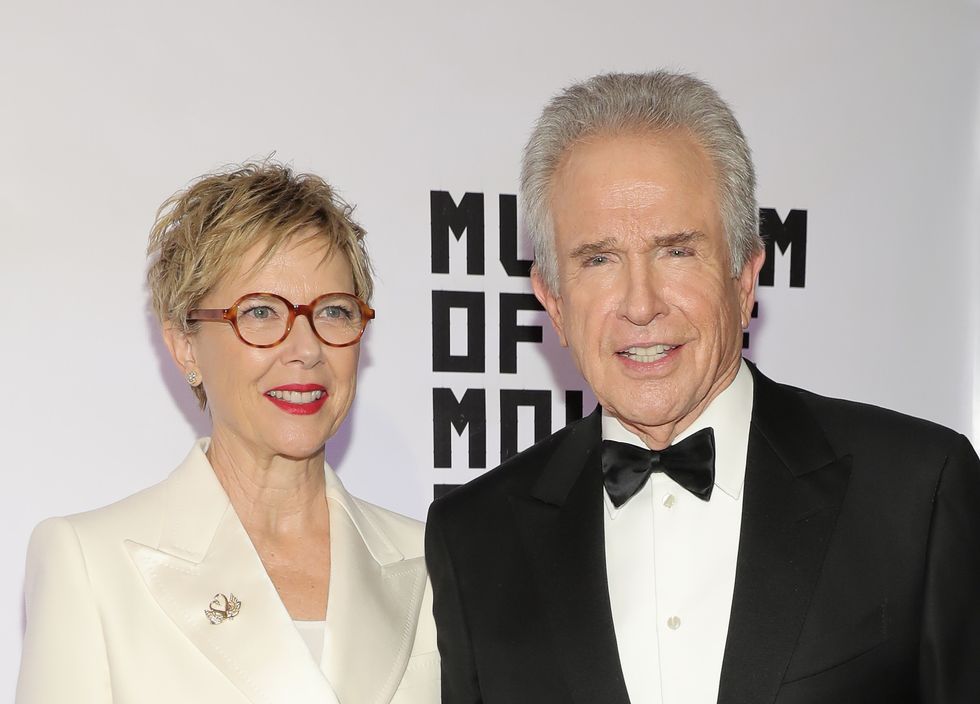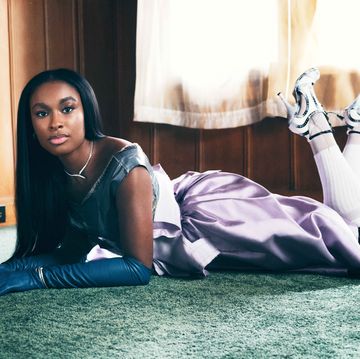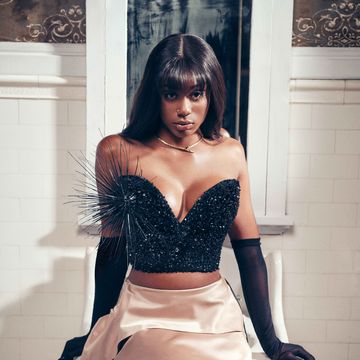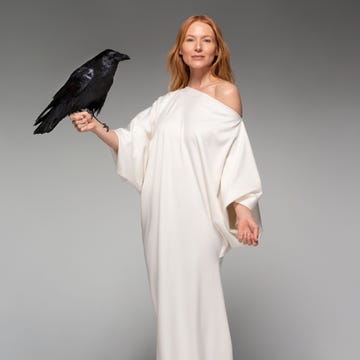A phone is ringing somewhere in this 22,000-square-foot Beverly Hills home high atop Mulholland Drive. Minutes later a bearded, blue-jeaned millennial enters the room without a word, approaches Warren Beatty, and discreetly flashes a yellow card with a name printed on it. "I'll call him back," Beatty says to Aaron, his personal assistant of five years. "But wait, you gotta hear this." Beatty turns to me. "Tell Aaron the story."
Well, Aaron, it was June 1988. Warren Beatty and his best friend, Jack Nicholson, had accepted Donald Trump's invitation to the Leon Spinks versus Mike Tyson heavyweight match in Atlantic City; Trump helicoptered the two of them down from Manhattan. The pre-party was a swell of supernovas: Madonna with then-husband Sean Penn, Oprah Winfrey, Bruce Willis, Billy Crystal, Muhammad Ali. But all eyes were on Nicholson and Beatty—the rogue and the Romeo, the coolest of the cool, already legends at 51—wearing sunglasses at night, seated together at Trump's table with the singer Paul Simon on one side and the artist LeRoy Neiman on the other.
For a young party reporter such as I, the only way to get through the throng of blazing paparazzi was to elbow my way forward, duckwalk under the table, and pop up between the stars on the other side. "Oh, hello!" Beatty said, just as Nicholson, who was being sketched by Neiman and was unaware I was there, leaned back without looking and into my recorder said, "Hey, Pro"—his nickname for Beatty—"be sure to tell me when the good pussy shows up."
Beatty laughs. "Didn't you sneak your recorder onto the table and leave it there and come back and get it?" he asks. No, no, it happened exactly the way I told it.
"It's funny, I remember it differently." He knits his brow, sighs heavily. "Invented memory is a subject that fascinates me." He cites two recent memoirs, one by a former supermodel and the other by a famous singer, each telling tales of Beatty-induced heartbreak. "Now that I've been around for as long as Howard Hughes was around, when I hear or read stories about myself that are simply inventions, well, it makes you laugh." He mentions Hughes, whom he portrays in this month's Rules Don't Apply, alongside costars Lily Collins, Alden Ehrenreich, Haley Bennett, and his wife, Annette Bening. It's a film Beatty was writing and developing when I profiled him for Premiere magazine in 2006—and decades before that. "I like to quote Henry Ford: 'History is bunk,'" he says. "Napoleon said, 'History is a collection of lies agreed upon.' Do you know what Winston Churchill said? 'History will be very kind to me because I intend to write it.'" Beatty, 79, stabs the air with his index finger, smiling a twinkly-eyed smile.
When it comes to men in Hollywood, there hasn't been a man like Warren Beatty, ever. Given the Insta-tell-all culture we now live in, there never will be again. Twelve books have been written about him, none of which he's read all the way through. He starts them, then stops as the inaccuracies pile up, often within the first few pages. This has a lot, though not everything, to do with women in Hollywood, about whom Beatty is expert in myriad ways. An irresistible, inexhaustible subject, he's sui generis as an actor, writer, director, producer, and lover.
Like Brad Pitt in Thelma & Louise, Beatty became a star in his first major role—Elia Kazan's 1961 film Splendor in the Grass, opposite Natalie Wood—and he never had to audition for another part. His pull was projecting a strong masculinity with an undercurrent of tenderness. Being gorgeous helped. A singular talent with 14 Oscar nominations, a win for Best Director (Reds, 1981), and an Irving G. Thalberg award (2000), Beatty had Pitt's beauty, Ryan Gosling's charisma, George Clooney's charm, Robert Downey Jr.'s wit, Casanova's libido, and the intellectual firepower of an all-time Jeopardy champion.
Men and women are drawn to him in equal measure. From an early age, he's been a sage adviser to friends and colleagues and politicians (from Bobby Kennedy to Hillary Clinton), loyal and insightful—a hotline for people in need, who need the people he knows. He's intensely curious, and that—along with his emotional intelligence—is perhaps the sexiest part of all.
You couldn't capture Beatty's complexities on paper. To get him, you have to watch him on film. He himself says, "Character is plot, and casting is character." Which says much about the women he casts in his movies, and more about the empathy he brings to his own roles, including the subtle sexual confusion of his Clyde Barrow (Bonnie and Clyde, 1967); his quiet pain of unrequited love for a brothel owner (McCabe & Mrs. Miller, 1971); his warring loyalties between the Communist cause and the woman he loves (Reds); and his comical, suicidal politician in Bulworth (1998)—the last two of which he also cowrote. (Spoiler alert: In his first film in 15 years, he breaks hearts again.)
His projected vulnerabilities were in beautiful contrast with the strengths of the female characters playing opposite him—Julie Christie and Goldie Hawn in Shampoo; Christie and Dyan Cannon in Heaven Can Wait (1978); and Halle Berry in Bulworth—which is not to say the women in these movies weren't complicated, too. "Warren has never had a problem understanding the contradictions that are within women," says Annette Bening, who married Beatty after they fell in love on the set of 1991's Bugsy. "And he also has a sense of humor—it's much more easy to be earnest. He has a way of finding what's melancholy, complex, sad, ridiculous, and funny, all in the same narrative."
As he prepares for the American Film Institute opening-night premiere of Rules Don't Apply on November 10, it's not an exaggeration to say that only a handful of male filmmakers come to mind who've consistently given women such fully evolved, complicated onscreen lives: Billy Wilder, Pedro Almodóvar, Baz Luhrmann, Woody Allen…and Warren Beatty.
"Warren's not appreciated as much as he ought to be, and I think it's because he's so fucking handsome," says Carrie Fisher, whose first movie, Shampoo, was with Beatty. "Oftentimes you find someone who is good-looking like that—male or female—and that's where it ends. For him, it was just a beginning."
Beatty sits in his cozy kitchen alcove, crunching away on vegan chips and rice cakes with peanut butter. On a vacant seat sits a linen pillow that states, in bright-red letters, YOU'RE RIGHT—a gift from Bening. The two have four children, and the domestic scene here is a long way from the days when this stretch of Mulholland was known as Bad Boy Drive, so called because Beatty, Nicholson, and Marlon Brando lived within a stone's throw of one another. ("How many women were there? Easier to count stars in the sky," one biographer mused about Beatty's love life.) Among his sustained relationships were Joan Collins, Natalie Wood, Leslie Caron, Julie Christie, Diane Keaton, and Madonna. It would be easy to assume he escaped his Richmond, Virginia, Southern Baptist roots guilt-free.
"I would say that my fame did rather coincide with the strength of the women's movement, particularly the early '60s. And, um…I think that I was smart. I saw what was happening, and I liked what was happening. To some extent, one might say that the independence of women granted me a higher level of independence." He smiles. "But to say that sexual guilt did not plague me, that is not true," adds Beatty, who lost his virginity at 19. "If that were true, I would not have made this movie."
Set in 1958 (the year he moved to Hollywood), Rules Don't Apply stars Lily Collins as a wannabe starlet and Alden Ehrenreich as a chauffeur, two naïfs working under contract for billionaire film and aviation mogul Howard Hughes, whose edict is no monkey business between employees. You know what happens. As in all of Beatty's writing (he's cowritten and directed four films), big issues are at play in the script: love, religion, guilt, money, sex, power, more guilt, greater love…. "I wanted to make a love story," he says, "between two young people who were religious—the girl a Baptist, the boy a Methodist—and who survive it."
If you want to see the cost of the alternative, stream Beatty's classic satirical comedy Shampoo (1975). Cowritten by Beatty and Robert Towne (Towne had won the Best Original Screenplay Oscar for 1974's Chinatown), the film is an acute study of the sexual revolution set against the backdrop of Nixon's 1968 election, starring Beatty as a Lothario hairdresser juggling his balls and blow-dryer among a woman he loves (Christie), an actress he doesn't (Hawn), and a wealthy mistress (Lee Grant) whose teenage daughter (Carrie Fisher) seduces him with the line, "You wanna fuck?" It's a razor-sharp French farce with an ending as unexpected and haunting as a one-night stand.
After meeting and being taken with young Carrie on the Shampoo set—she was visiting with a friend—Beatty had to talk her mother, actress Debbie Reynolds, into letting her 17-year-old daughter take the role. "Debbie wanted me to change the line," Beatty recalls. "I said, 'I don't want [her] to say, 'Do you want to make love?' That wouldn't be funny."
"She didn't want me to say 'fuck,'" recalls Fisher. "'Screw' was about as far as she would go." Beatty prevailed. "I'd never acted in anything, not even in school," Fisher says. "I was utterly avoiding it, having seen the waning of my mother's career. That seemed heartbreaking. Only Warren could have made it so appealing. He was very patient and worked with me. He put me in show business." And he remains an ally: When Fisher was workshopping her one-woman show, Wishful Drinking, in 2006, Beatty came to see it twice, giving her copious notes.
Here's a counterintuitive take on Warren Beatty: This great seducer of women has been a continuous advocate for us, in his movies and in the business. While he's known to be controlling, he's not above seeking others' opinions. "He invited me into the screening room to help with the editing" of Rules, Lily Collins says, still surprised that he did.
A wellspring of advice and encouragement, Beatty gives it freely, happily, which is why his phone is always ringing and Aaron is always Vanna White–ing it with the yellow flash cards. When I interviewed Nicole Kidman in 2008, she recounted coming to America for the first time and meeting Beatty for the role of Tess Trueheart in Dick Tracy. "He said, 'No, you're too young for Dick Tracy,'" Kidman said. "'But I do have somebody you should meet.'" Beatty picked up the phone and called his friend Towne, who was writing Days of Thunder, starring Tom Cruise. The next thing Kidman knew, she was playing a brain surgeon opposite her future husband. "So Warren changed my life."
"The thing about Warren is that he alone can make you feel like you have true potential for greatness," Diane Keaton said when I profiled her for ELLE's 2010 Women in Hollywood Issue. "He alone can make you feel, 'Oh, I could be a politician, I could be a director, a creator.' He has the capacity to let you believe fantasies that are of course completely untrue. And then take you there. It's a very seductive and thrilling feeling, but of course has nothing to do with reality. But at the same time, he has the gift for seeing the potential in people and he appreciates them. He could have been a psychiatrist. And he sees what's moving in everybody. He encourages talent and he sees it in a varied way. It's not just exclusive. His insights are brilliant."
He's still a pain in the ass. As a director, he's famous, or infamous, for his take-after-take search for the Holy Grail of moments, the end justifying the means. "It was just 'Do it again, do it again, do it again…' At one point I think we got up to 100 takes," recalls Haley Bennett, who plays a less-than-virginal contract actress in Rules Don't Apply. "I kept looking over at Lily, like, 'Oh my God, this is unrelenting.' She's like, 'You have no idea.'"
"Long after we'd gotten what would have been great," Collins says, "he drives you to this exhausted place of almost creative genius. Because he'd never get the performance out of his actors that he would get without having driven them to that point that they thought they were already past."
This approach is extended to his interlocutors. "Before you turn that thing on," Beatty says on a Sunday night in L.A., sitting in his favorite deli booth, gesturing at my tape recorder, "let's have an interesting conversation, then we'll go on the record and I'll be boring." He thinks this is funny, but he's not kidding. Over the years he's burned my ears with off-the-record anecdotes about the likes of Marilyn Monroe, Edie Sedgwick, John F. Kennedy…and other fancy people who are still alive. He loves to gab, and he gabs like a girl.
But when the red light is on, Beatty squirms and exhales heavily through his nose as if his appendix were bursting. More often than not, when you ask a question, he slips and slides off the hook with one of the following: "Um, um, um…," or "I don't want to be reductive," or "Turn that thing off for a minute."
A text dings! from my editor Lisa in New York, who is pressing me to get the story and get it in. Desperate times call for desperate measures. I tap FaceTime on my iPhone and hand it to Beatty. Lisa answers, expecting me. "Oh…hi!" she says, clearly shocked, and unhappy, to see Warren Beatty. She lets out a startled yelp. Her hair is pulled back, and her face is covered in dried dark muck. "I wasn't expecting a call from you. I have a clay mask all over my face." She does.
Beatty is undeterred. "I think that looks very good; you should get on a plane immediately. What is it? It's clay? Oh, wow!"
There he goes with the charm, which I must nip in the bud: "Lisa, believe me, I'm pulling teeth here. He is a bad boy. Warren, tell her how bad you've been."
He laughs, mesmerized by the sight of her caked visage. "The clay is working, by the way. It really is very…it takes the subject of narcissism off the table, and the more I see it, the more impressive it is." He's incorrigible.
Reduced to being reductive, I say, "Let's go through a list of your leading ladies and see what memory each sparks, starting with Splendor in the Grass's Natalie Wood. "If you're asking me to free-associate," Beatty advises, "it's better to ask the question like, 'Natalie Wood, question mark.'"
Okay. Natalie Wood? "Um…um…[heavy sigh] well, I would feel guilty being reductive. I couldn't do justice by saying what springs to mind; if I would begin by saying, 'Victimized by being a child actress at the age of four,' then that would be reductive. And that would apply to anybody that you mention. I don't want to give them short shrift."
Well, would he like to hear what some of his leading ladies have had to say about him? He's all ears.
Keaton: "I could never, ever believe how beautiful he was. It was really hard not to be completely seduced by the fact that he was so pretty. Sorry, for the most superficial, horrible reason—but he was, I just couldn't take my eyes off him."
Fisher: "Warren isn't into women just sexually. He's into you as a person, a mind, a spirit, a soul—that's more seductive than anything."
Collins: "Warren loves women, right? But Warren loves intellectual, feisty women who stand up for themselves and won't take no for an answer."
Would he like me to continue? Beatty nods, his eyes closed, sporting a small smile.
Hawn: "You don't walk away from Warren as a friend. You would be missing something. He's a very powerful force that's important to have in your life. Particularly when you want to speak to somebody who's got a lot of clarity. He's got a lot of clarity in various and sundry subjects and situations. I trust his perception in human relationships. He sees behavior very clearly."
Bening: "We're very different in many ways. I can be maddening and he can be maddening, for sure. Any relationship that ends up lasting, it's not that you're alike, it's more that you want the same thing. There's definitely a fire there between us. I can say that without hesitation."
Bening is a subject Beatty can be squeezed to expound upon. He met the actress for the first time four doors down from here at an Italian joint in this strip mall, when he was considering her for Bugsy. Afterward, director Barry Levinson asked Beatty how the meeting went. He replied, "I'm going to marry her."
"It's true; I felt it would happen," Beatty says, smiling. "The unconscious is much smarter than the conscious. My immediate unconscious response caused me to stop eating the garlic chicken that was put in front of me. I felt that there was a stroke of luck here. And it came at a good time." He raises his eyebrows and raps his knuckles on the table, repeating, "I stopped eating the garlic chicken." ("I remember him enjoying the garlic chicken deeply," Bening says. "And the garlic rolls.")
"I wanted to meet her for Dick Tracy, and she was unable to meet with me," Beatty continues. "She canceled her meeting with me because she felt that she should go to New York to be present for her ex-husband, who was having surgery, and she felt that it might be good that she was there. And I was very impressed by that. He was her ex at that point. I felt that really…I liked that."
Back in New York, Beatty is sitting in the waiting area after a screening of Rules Don't Apply. Aaron is with him, as are a few others unknown. Beatty is eager to hear what we think. Bennett was spot-on when she called earlier and said, "It's a throwback to the films that I love from the past—Frank Capra and Billy Wilder. It gives you the same feelings of those films of a bygone era. Warren's one of the all-time-great filmmakers." A voice in the background said something that made her laugh: "I'm with someone who just said he's one of the all-time-great hunks." There's no doubt you'll see him sitting front row at the Oscars in February.
I tell him I've brought him a present from the past and pull out the recorder and the tape from the 1988 Atlantic City party. He listens to it, smiling, reliving the moment. It was just the way I told it. Beatty calls everyone to gather in close, and we play the recording again. Watching him regale us with memories and solicit our criticisms of the movie, I'm reminded of something Carrie Fisher told me about him.
"He's an observed observer," she said. "And that is a very rare thing to be."
This article originally appeared in the November 2016 issue of ELLE.
